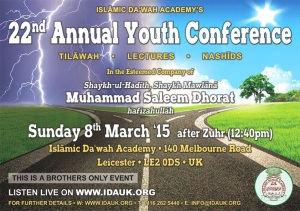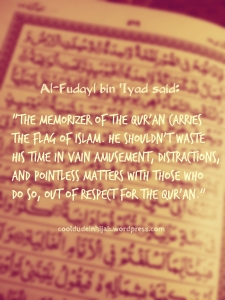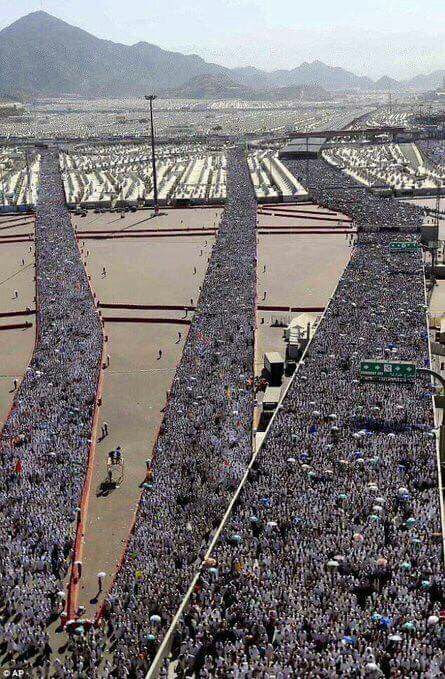بِسْم الله الرحمن الرحيم

All praise is due to Allah, the all-knowing, the all-seeing and we beseech Allah to send His noblest blessings on the Seal of the Prophets, Our Master and Prophet Muhammad (Sallallaho Alayhi Wasallam).
Dear respected Brothers and Sisters,
Please see below a synopsis of the conference I attended, Sunday 8 March 2015. Alhumdu Lillah, there were hundreds, rather thousands of brothers who attended from all across the country. Nice to see so many brothers under one roof, seeking knowledge of Deen. Amazingly organised and orchestrated by each and every volunteer at the Islamic Da’wah Academy, once again – Ma Sha Allah!
A reminder for those who attended.
A backup for those who missed it.
Mawlānā Yasir Saheb, AlRahma Academy, Chorley.
Mawlana started by saying how Islam has taught us everything, from going to the toilet to running a government. Islam has the answers. He narrated the story of how a Jewish man once sarcastically asked Salman Farsi (Radhi Allahu Anho), “Is it true your Prophet teaches you how to go to the toilet?” He replied, “Yes, our Prophet (peace and blessings be upon him) has taught us everything. Even how to relieve ourselves. Not to use our right hand. Not to use bones to clean ourselves.” Islam covers all aspects of life.
The religion of Allah is being portrayed as barbaric and violent. A religion of terror! Whereas the Messenger of Allah (Sallallahu Alayhi Wasallam) was most-compassionate & gentle & merciful. The most blessed person to walk on the face of the earth.
But who is to blame?
The inflammatory media?
For how they portray Islam, magnifying certain individuals and groups. And tarnishing all Muslims with same brush. But the Muslims themselves are also to blame, for their conduct, for their ill-character. We really are not presenting Islam the way it should be presented.
Allah says, “It is due to the mercy from Allah you (O Muhammad) were gentle with them. Had you been harsh or hard-hearted they would have disperse from your company.” (Surah Ale Imran) If we want to attract people to Islam, we need to adopt the same characteristics and values; being gentle and merciful. Look at our Prophet (Sallallahu Alayhi Wasallam), how each of his companions (Radhi Allahu Anhum) felt the most closest to him. Simply because he treated each one equally and fairly. How do we treat people?
The Prophet’s (Sallallahu Alayhi Wasallam) mercy was not constricted to the Muslims or one nation: “We have sent you as a mercy to the worlds.”
Tufayl ibn Amr alDawsi (Radhi Allahu Anhu) was sent to the tribe of alDaws, to teach them and invite them to Islam. They ignored the message. He returned to the Prophet (Sallallahu Alayhi Wasallam) and said, “Pray against them, for they have ignored the message!” The Prophet (Sallallahu Alayhi Wasallam) raised his hands, “O Allah guide alDaws. And bring them to us.”
Similarly in Uhud, the Prophet’s (Sallallahu Alayhi Wasallam) face was bleeding. If there were a time when He (Sallallahu Alayhi Wasallam) would have made Dua against anyone, it would have been in the battle of Uhud. But despite all of this, He (Sallallahu Alayhi Wasallam) raised his hands, “O Allah forgive my people, for they do not know.”
We need to adopt this example of mercy and compassion. We must be conservative of how we deal with people. Allah on the Day of Judgement will be very lenient in His rights, but strict in the rights of others.
Mawlana then continued with a story of a man, who reached his death. When angel of death came to him, he asked him if he had done any good actions. He said I have nothing! The angel said think carefully, think of anything. He said actually there is one thing, I used to be a tradesman. If people came to me and they wanted more time, I would grant it to them. This man was forgiven for this one deed.
Allah grant us love, mercy and compassion to deal with his creation. Ameen.
Mawlānā Farhan Saheb, London
There are many reasons for the corruption and destruction of the Ummah: Allah says, “Corruption has appeared throughout the land and sea by [reason of] what the hands of people have earned so He may let them taste part of [the consequence of] what they have done that perhaps they will return [to righteousness].” (30:41) Every time we sin, we are disobeying Allah collectively. We are placing a black dot on our hearts, and for every sin our hearts are getting darker and darker. The more we sin, we are distancing ourselves from Allah.
Let us look into ourselves, you look into your life and I will look into mine. We will find some of us have become so immodest, we sin in the open; in school, or college or at work. We sin in front of our parents, friends, colleagues and even your local Imam! Then there are some of us who wear Islamic attire, have a religious look, but we sin when nobody is around. When everyone is away, when we are alone, we think nobody is watching, we sin. But, Allah is watching – He always is. We need to inculcate Taqwa (fear of Allah) in our hearts.
If we do not fear Allah, let us look at how Allah dealt with previous nations:
“So each We seized for his sin; and among them were those upon whom We sent a storm of stones, and among them were those who were seized by the blast [from the sky], and among them were those whom We caused the earth to swallow, and among them were those whom We drowned. And Allah would not have wronged them, but it was they who were wronging themselves.” (29:40)
Once the Prophet (Sallallahu Alayhi Wasallam) heard that his companions have become relaxed and enjoying themselves a bit too much. He informed them, “Informed them if you knew what I knew, you would laugh little and cry more often.”
Mawlana then recited:
“O mankind, fear your Lord. Indeed, the convulsion of the [final] Hour is a terrible thing. On the Day you see it every nursing mother will be distracted from that [child] she was nursing, and every pregnant woman will abort her pregnancy, and you will see the people [appearing] intoxicated while they are not intoxicated; but the punishment of Allah is severe.” (22:1-2)
The Prophet (Sallallahu Alayhi Wasallam) said, “We will sweat so much, 70 yards we will drown in our own sweat.” He (Sallallahu Alayhi Wasallam) also said, “The man with the least amount of punishment on Qiyamah will be a man, who has two pieces of coal from Jahannam from under his feet. This will cause his brain to boil. He will think nobody has punishment worse than him.”
Do we feel safe and secure from Allah’s wrath despite sinning abundantly? “Do the people of the city feel that the punishment of Allah will not come on them at night whilst they are sleeping.” Surah Anfal
Les us stop sinning! If we are fornicating with someone’s sister, tomorrow someone will fornicate with your sister. If we are messing around with someone’s daughter, someone will do the same to your daughter. If you steal from someone, someone will steal from you.
Don’t think Allah is unaware. Hadith informs us: “Allah gives respite to a Dhalim. But when he grips him/her they won’t be let off!” Shaytan encourages us to continue sinning, and shows us there is no harm in sinning.
Mawlana ended saying how youngsters look of to Umar ibn al-Khattab (Radhi Allaho Anho). Because of his dynamic and charismatic character. Even youngsters who are not on the deen, look up to Umar (Radhi Allaho Anho).
The Prophet (Sallallahu Alayhi Wasallam) told us if there were to be a Prophet after him it would have been Umar RA. From the sayings of Umar (Radhi Allaho Anho) is: “If Allah sends everyone to Hell on Qiyamah, except one person, I fear it will be me!”
Hadhrat Shaykh Mawlana Muhammad Saleem Dhorat Saheb (Hafidhahu Allah)
Allah Ta’ala through his grace and mercy has granted us all the opportunity once again to participate in this 22nd Annual Youth Conference. Allah grant us acceptance, make it a means of hidayah and soul purification, and everlasting salvation in the hereafter. Ameen.
Rasoolullah (Sallallhu Alayhi Wasallam) gives 3 very important instructions:
1. Tie the bond of kinship with those who break this tie.
2. Forgive those who oppress us
3. Be good to those who are bad to us.
Be good to those relative/kin who don’t behave correctly with you.
Good to near and distance relatives – very important command of Shariah.
The Prophet (Sallallahu Alayhi Wasallam) said, “The one who does not stay in good terms with his relatives will not enter Jannah.” (Even if he departs with Iman) he will not enter Jannah, without going into the fire of Jahannam first)
When The Prophet (Sallallahu Alayhi Wasallam) received first revelation. He came to Khadija (Radhi Allahu Anha). He didn’t doubt that he was made a Prophet, but he was very humble so he felt that there was a possibility that he would not be able to carry out the responsibility.
He (Sallallahu Alayhi Wasallam) said: “I fear over myself. I might not be able to fulfil the responsibility.” So if a person can’t fulfil responsibility then the mission is a failure and results in disgrace.
Khadijah (Radhi Allahu Anha) said, “Allah will Never disgrace you!”
Why?
Because you have 5 qualities.
Whoever has these will not be disgraced.
1. You tie the bond of kinship. (Your are kind to them. Look after their well being).
2. Take the responsibility of those people who are burdensome. (Mentally/physically handicapped. Those who are seen as burdensome by the community and even their own families).
3. You look after and help the poor.
4. Hospitable to guest.
5. Anyone you see suffering you are ready to help them.
Rasulullah (Sallallahu Alayhi Wasallam) remained silent. His remaining silent is affirmation that whoever has these 5 qualities he will not be disgraced.
Nowadays friends are more important than relatives. Those people are important to us who’s company we enjoy. Friend circle keeps changing.
Why?
Because where ever we realise he is more fun than him we change friends. So we have no friends and no-one is our friend. We are selfish. We are looking for enjoyment.
Those people who are friends for real, their friendship stays until death, Qiyaamah and in Jannat.
Friends will become the enemy of a friend in the court of Allah Ta’ala except for those friends whose friendship was based on Taqwa,
– For the pleasure of Allah Ta’ala.
– Friendship based on deen.
– Friendship for character
It is not WHAT you do, it is WHY you do it!
So, if you love someone it should be for his knowledge, his character, his morals and his deen. And if you hate someone, it should be because he is a dhalim or disunites the community.
Hadeeth: One who loves for the please of Allah and hates for the pleasure of Allah who gives for the pleasure of Allah and who prevents for the pleasure of Allah then his Iman is complete. Those people who love each other for the sake of Allah Ta’ala will be granted the shade of the throne of Allah Ta’ala.
Allah Ta’ala will announce: “Where are those who use to love each other for my sake?”
Rasoolullah (Sallallahu Alayhi Wasallam) said:
From the people of the past. A person left his town (from Banu Israeel) to visit his friend in another town. Allah Ta’ala sent and angel to ask this person. Where are you going?
I am going to visit my friend.
Are you visiting him because you are in need?
No
Are you visiting him because he done you a favour?
No
So why?
Only because I love him for the sake of Allah Ta’ala.
The Angel said, I have a message from Allah Ta’ala. I love you just as you love that person .
Let us not look at colour, race, background, wealth but let us love for the sake of Allah Ta’ala.
In the time of Umar Radhiyallahu Anhu. He was sitting in a room. First Abu Sufyan (Radhi Allaho Anho) entered – Father-in-law of Rasoolullah (Sallallahu Alayhi Wasallam), who was the leader of the Quraysh after Abu Jahl. Umar (Radhi Allaho Anho) looked up and carried on what he was doing.
Next Umar (Radhi Allaho Anho) looked up, Bilal (Radhi Allaho Anho) entered. No status as family lineage, non-Arab but Umar (Radhi Allaho Anho) said make way for Bilal.
He used to say I have 2 masters, Abu Bakr (Radhi Allaho Anho) our master – who freed our master Bilal (Radhi Allaho Anho).
Equality and Justice is a teaching of our religion.
Let us look at the Conquest of Makkah. After 8 years of exile. In this day of glory who is sitting on his camel. Entering Makkah as a liberator. head lowered. He had with him 10-14,000 companions (Radhi Allaho Anhum) he was constantly praising Allah:
“There is no God but Allah – the Alone, He has no partner.”
“It is only Him, who helped His slaves.”
“It is only Him, who fulfilled the promise.”
“It is only Him, who defeated the coalition.”
What was amazing, was the person sat on the camel, behind him; not Abu Bakr (Radhi Allaho Anho), nor Umar (Radhi Allaho Anho), nor Hasan (Radhi Allaho Anho) or Husayn (Radhi Allaho Anho), it was Usamah son of Zaid (Radhi Allaho Anho) (freed slave). He (Sallallahu Alayhi Wasallam said, “O Usamah! You are one of the most beloved to me and your father was one of the most beloved ones to me.”
The first Salah after the conquest of Makkah. “Where is Bilal? Climb the Kabah and call out the first Adhan after conquest of Makkah.”
One of the people of Makkah said, “My father is lucky to have died to not see this dark day. One said could Muhammad not find a better person that this black crow.”
Jibraeel came with wahy:
“O people, we have created you from one male and female, and we have made you into tribes and different families so that you are able to recognise each other. The most honourable amongst you is the one who has the most Taqwa.” Surah Hujurat
It is not your beauty or your wealth that counts, it is the Taqwa in your heart. Bilal (Radhi Allaho Anho) had this Taqwa – so it elevated him.
The one who does good to those who are good and doesn’t do good those to those who are not good is not a reconciler. The one who when his relatives misbehave with him he does good to them is the real reconciler.
Tie the bond of kinship even if your not at fault for the sake of Allah Ta’ala.
• Salaam
• Send gifts
• Help them
The closest of kin are parents, above relatives. What does everyone want in life? Long life and lot of money. One who desires he has a long life and a lot of wealth he should tie kinship.
2nd command.
Forgive that person who wrongs you – This is a very courageous action.
“The person who practices patience (when trouble when innocent) and also forgives, this is a action that requires a lot of courage.”
What did (Yusuf Alayhis Salam) say to his brothers?
“There’s is no blame upon you. May Allah forgive you.” ( He also made dua for them)
When he met his father he made an excuse for his brothers. “Allah has united us after shaytaan put enmity between us.”
Conquest of Makkah- He (Sallallahu Alayhi Wasallam forgave Abu sufyan (Radhiy Allahu Anho) but also honoured him. “Who ever enters the house of Abu Sufyan is forgiven.”
PRINCIPLE:
‘We should never do anything that we have say sorry to Allah or his creation, and if we do make a mistake don’t hesitate in asking for forgiveness’.
Saying sorry is not enough, until the person hasn’t forgiven us. If anyone from the creation makes a mistake then without him asking we should forgive him.
“And forgive, do you not wish that Allah Ta’ala forgives you?”
Who ever swallows his anger when he has the ability to punish the wrong doer. Allah Ta’ala will call him in the stage of the whole audience and say from all these hūrs choose which you desire.
A person does not swallow something which is more beloved in the eyes of Allah Ta’ala, than the swallow of anger.
Moosa (Alayhis Salam) Asked: “O Allah! Who is the most honourable in your eyes?”
“The one who forgives when he has the upper hand.”
Conquest of Makkah Rasoolullah (Sallalahu Alayhi wa sallam) asked: What do you expect from me? They said you are a noble brother and the son of a noble brother. Rasoolullah Sallalahu alayhi wasallam said what Yusuf Alayhi Salam said. “There is no blame on you, may Allah Ta’ala forgive you.”
Nowadays we hear people say: I will never forgive you! I will see you in the day of judgement.
We should think do we not make mistakes? Will people not ask from us on Qiyamah?
There is a saying in Arabic:
ان قلت لى واحدة تسمع مني عشرة
The basic translation of which is, of you say one (bad) thing to me. You will get ten in return. Shaykh Saheb said, we should be such if we hear 10 bad things from someone. We don’t say ONE in reply!
Be good to the person who is bad to you. Shaykh Shibli some people opposed him, he went out for a walk. He was in a state of anxiety and fatigue. Reclined against a date-palm, Allah gave him a miracle – karamah. The date-palm spoke to him, “O Shibli! Become like me, people throw stones at me and I throw fruit at them.”
Conclusion:
1. Tie the bond of kinship
2. Forgive those who oppress us
(Forgive everyone even without them asking)
3. Be good to those who are bad to us.
If you do this your heart will be at rest In Sha Allah.
May Allah Ta’ala grant us all the ability to practise on this.
Ameen.
May Allah grant Shaykh Saleem Saheb a long life, accept his efforts, grant him perseverance and may we all benefit from such luminaries. Ameen Ya Rabb!
Further info/talks/lit: http://idauk.org/
Ismail Ibn Nazir Satia
23 Jumadal Awwal 1436
 فليتكَ تحلو والحياةُ مريرة
فليتكَ تحلو والحياةُ مريرة









 Jihad for Truth
Jihad for Truth
![1422040968296[1]](https://mylittlebreathingspace.files.wordpress.com/2015/03/14220409682961.jpg?w=300&h=300)
